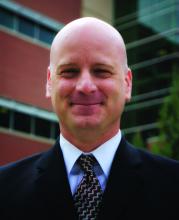If prior SHM annual meetings are any guide, a highlight of the upcoming HM18 conference will be the Scientific Abstract and Poster Competition. This event, also known as the Research, Innovations, and Clinical Vignettes (RIV), has become one of the annual meeting’s most popular events. Crowds of attendees cluster around posters to read abstracts summarizing some of the most exciting, cutting-edge research in hospital medicine.
Networking in that crowd is a major factor in the RIV’s popularity, says the HM18 Innovations chair, Benji K. Mathews, MD, FACP, SFHM, CLHM, section head of hospital medicine at Regions Hospital, St. Paul, Minn., which is part of HealthPartners, the largest consumer-governed, non-profit health care organization in the U.S.
“From my standpoint, the power of this Innovations RIV competition is the opportunity to network,” said Dr. Mathews, who is also assistant professor of medicine at the University of Minnesota, Minneapolis. “In addition to primary authors, often these posters have several different people involved, and then there’s the foot traffic: We’re expecting thousands of people to walk through. The hope is to create the opportunity to network, to collaborate intergenerationally and also cross-institutionally.”
The RIV competition features some 1,000 posters this year, Dr. Mathews said. Plenary and oral sessions are chosen from the pool of abstracts prior to the meeting, and their authors are invited to present on-site at HM18.
But in spirit, the RIV is not really a competition, said RIV chair Ethan Cumbler, MD, FACP, FHM, professor of medicine at the University of Colorado.
“It’s really about sharing the latest science and the cases and innovations that are going to change practice tomorrow. The RIV is about sharing with our colleagues and moving the science of hospital medicine forward,” he said.
“Hospitalists can share and discuss their work and exchange ideas in a nonthreatening, collegial manner,” Dr. Mathews added. “In the end, we understand it’s not all about winning. We try to make sure it’s an atmosphere where people can engage and collaborate with each other.”
As far as the competitive element goes, the judges’ decisions are driven by an abstract’s content, organization, and style, Dr. Mathews said. “When we look at abstracts, affecting patient care in the authors’ own hospital is a beautiful thing, but is there a potential in this abstract to reach the masses? Is it able to be implemented beyond their local microcosm to affect people regionally, nationally, internationally? If there’s potential for that, that’s usually a good abstract.”
What’s new in 2018
The more than 1,000 posters and oral presentations at HM18 is a new record, and it demonstrates the growth of hospital medicine as a scientific field, Dr. Cumbler said.
“We received a huge number of submissions,” he revealed. “We see that trend rise, year over year, and the quality has been going up as well.”
New this year is a Trainee Award category for resident and student authors. Another difference in 2018: The top 15 advances in Research and Innovations have been given a special track on day 2 of the conference, with oral presentations by the authors sharing their work.
The Vignettes are being featured in a new way as well. “We have so many incredible cases that we’re going to have a clinical vignette luncheon on two different days of the conference,” Dr. Cumbler said. “These are cases that we want to highlight, so that the experience of a hospitalist in one part of the country could help a hospitalist provide the right diagnosis for a patient on the other side of the country. There are lessons to be learned in clinical medicine, and our clinical vignettes is a fantastic way of sharing them.”
In making their selections in the different categories, the judges aimed to highlight some negative studies this year, Dr. Mathews said, which is a slight departure from previous years. “Sometimes you try something and it didn’t work, and it’s important to share that so we don’t just try the same thing over and over.”
This year, Research and Innovations abstracts will be grouped by theme, making it easier for attendees to navigate the posters. “If you’ve got a particular interest in a topic like transitions or communication, you’ll be able to find that portion of the poster session and talk to some of the people who are doing groundbreaking work in that topic,” Dr. Cumbler said.
He also noted that he expects to see a strong expression of RIV content on social media from HM18, as judges encounter some of the best and most interesting work at RIV. Dr. Mathews is similarly enthusiastic about that amplification of the work.
“I love that the conversation continues into social media platforms such as Twitter,” he said. “People are engaging back and forth, saying, ‘Hey, take a look at this poster.’ Being in a room with countless people interested in research innovations for a field that’s still relatively young – I love that there’s movement toward that.”
© Frontline Medical Communications 2018-2021. Reprinted with permission, all rights reserved.

